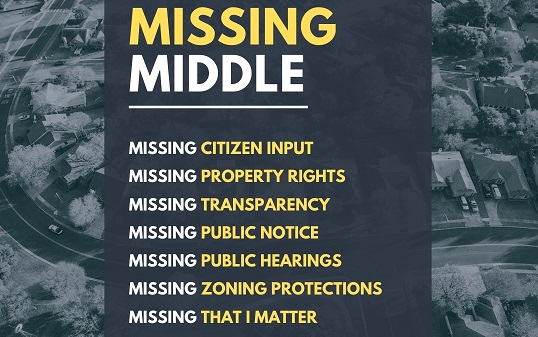
Former Planning Commission Chair Bob Mulder highlights the need to improve Raleigh’s missing middle housing rules. Focusing debates on criticisms of pro and con stakeholders only diverts attention from what we all (except the greediest) agree on: Adding density in the right places is good, but the missing middle rules should be improved – with a more open, public engagement process about how to actually retain, replace and produce housing that’s affordable to current working families and households.
Living in a wealthy neighborhood like Hayes Barton does not mean that their concerns are less valid than someone who might live in a neighborhood like mine (Brentwood), or Starmount or any other similar neighborhoods, or that they are less socially conscious than the rest of us. I live in Brentwood.
The idea behind “Missing Middle Housing” is to provide housing that is affordable to a wider group of buyers or renters. It is a laudable goal. The term “affordable” is a slippery term. What exactly does it mean in terms of sales price or rent?
Will the “Missing Middle Housing” be affordable to people making 30%, 50% or even 80% of the Wake County Median Income? These are the folks that need this housing the most. In my opinion, it’s highly unlikely that it will be affordable to the aforementioned income categories.
With Apple and Amazon increasing their presence in Wake County, and all the other folks moving here from the Northeast and the West Coast, list prices and rents won’t be coming down significantly any time soon. Anything that will be built in the foreseeable future will be market rate housing.
There was an article on WRAL about a month or so ago about a new 1,700-unit single-family neighborhood being planned in southeast Raleigh. Projected pricing for those homes will be in the $400,000 to $600,000 range. Hardly “Missing Middle Housing.” Builders are not building truly affordable housing.
The changes to single-family zoning made by the current City Council were done without any notice to existing property owners. In Charlotte, proposed zoning changes to properties located in a Frequent Transit Area were all notified by postcard to give residents a chance to respond and comment and become informed about the potential changes. This was not done in Raleigh. The changes were made by the current City Council with no notice whatsoever to citizens whose properties were affected. The current City Council’s defunding of the CACs (Citizen Advisory Councils) over two years ago essentially stopped all City supported public participation and meaningful community engagement.
I can tell you that except for a couple of my neighbors that I have informed about the changes, no one knows what’s been going on concerning zoning changes.
I am in the real estate business, and I can tell you from experience that buyers purchase a home in neighborhoods zoned for single-family because they want some space for gardening, for the existing tree cover, for room to move around and some semblance of privacy. Now, it’s possible in my street (a Frequent Transit Area) for a builder to come in, tear down a house next door to me that is still in the affordable range ($300,000 +/-) and build a 40′ multi-story multi-unit building. That means removing most if not all of the tree cover and adding more paving for parking. I would lose privacy and the benefits of the tree cover from the adjoining lot. Are my property rights being diminished? My Realtor organization gets pretty wound up on property rights issues, but I haven’t heard anyone from the real estate industry tackling this issue.
By the way, my neighborhood with the original R-6 zoning (6 units per acre maximum) allows duplexes on 1/3 acre lots. So, we do have an adequate number of duplex units and single-family rentals. As a matter of fact, there have been agents over the past few decades that have steered buyers away from Brentwood because Brentwood “had too many rentals and was too close to Capital Boulevard.” Of course, because we are in such a good location in combination with an inventory shortage, that has changed.
Most real estate agents in this area are clueless about these stealth zoning changes. The new zoning/development changes are in my opinion material facts that will have to be disclosed to potential buyers. For example, let’s say an agent helps buyers purchase a house in what the buyers think is a neighborhood zoned for single-family homes. Six months down the road the house next door to them is torn down and a 40′ multi-unit building with a parking lot goes up next door to them. Who are they going to hold responsible for not telling them about this possibility? I think that lawsuits are a distinct possibility.
It’s unlikely that these changes will happen in neighborhoods with homeowner’s associations that have restrictive covenants.
Citizens should have been notified and given the opportunity to debate and weigh in on these changes. This City Council – with the exception of Councilor David Cox – has chosen to completely ignore anyone with opinions that differ from theirs.

